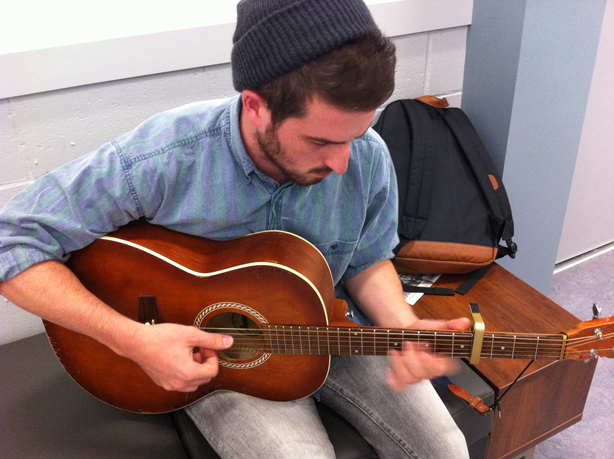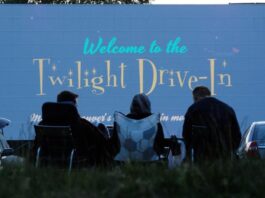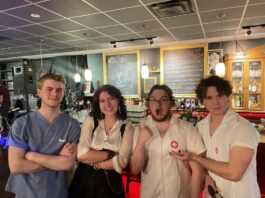By Jess Wind (The Cascade) – Email
Print Edition: September 11, 2013

Luca Fogale is currently competing in The Peak Performance Project. He has recently returned from Boot Camp and is preparing his charity initiative. He will be performing in the top 20 showcase on September 26 at the Fortune Sound Club in Vancouver.
What made you apply to the Peak Performance Project in the first place?
I love The Peak; it’s such a great station, it’s the station in Vancouver that I listen to. I used to be big into classic rock. But then I kind of got into more indie stuff and it kind of just scratched me right where I itch. I’ve been listening to The Peak for about five or six years now and then I heard about the Peak Performance. It’s such a big thing – it’s a big triumphant competition. I just wanted to get into bootcamp; that’s all I wanted to do. I did that. Everything else from here is a treat.
So what is the competition like? What kind of process did you go through to get in?
I forgot about the deadline, so I applied with four days left in the application. [I had to] film a music video, get a single done, and apply and somehow I got it – don’t know how. It’s been crazy ever since. We had a performance at the Khatsahlano [Music & Arts]Festival down in Kits and that was in July.
Boot Camp was the first big thing. Now we have to do all the challenges. We have to do a charity initiative and we have a merchandise challenge and then there’s the showcase and then there’s voting and judging and they tally up all the points and then they pick winners. They pick the top three and the top three get to play at the Commodore for the last showcase, which would be nuts.
It’s been great so far. It’s tough to solo because I’m by myself. With a band you can delegate … I try and do little bits of everything, but it’s tough to try and stay organized.
How was Boot Camp for you?
We learned so much at Boot Camp and it’s still kind of all trying to cram itself in my head. Like all the different social media stuff and all the different ways to get your music out … We did performance coaching and they give us reviews after our shows. Everyone had a little showcase, and they would critique it … We learned so much; we all had private sessions and vocals and performances and such.
Did it feel like a reality TV show?
It didn’t because it was a safe camp: there was no judging involved with the camp.
It was great because it wasn’t scored. It was safe to learn.
The Peak Performance Project gives the contestants $3000 to fill gaps in their performance. You used it to make a music video and feed the homeless. Tell me about that.
I just wanted to take a different approach. As a performer I’m not super exciting to watch – I just sit there and play guitar … It was so easy to make people’s day; it was just a sandwich. We handed out socks and underwear too.
We had an opportunity to make a video and it’s always been such a big problem in Vancouver. It’s so stigmatized and it’s a pretty shunned part of our city. I learned so much about what it takes to be happy … We [brought] like 20 sandwiches, 12 pairs of socks and underwear – it was like 60 bucks. It was nothing, pennies. A lot of people got stuff, a lot of people got fed. So it’s something I’m going to try to keep doing more regularly. It was a good learning experience.
Do you always try and make a statement with your music?
When you kind of have music that’s very lyrical I try and address a lot of things and try and convey some sort of message, whether it’s talking about bigger issues or if it’s a love song, it’s always talking about something important.
With folk, you can tell a lot of stories, you can cram a lot of stuff in. I just wanted to show people that it’s not that scary. I was never intimidated or threatened. A lot of people drive down Hastings and lock their doors, roll their windows up.
Those people live in our city; they’re Vancouverites too. So it just kind of sucks that we have that area that’s pushed to the side. It’s just something that’s always bugged me about the city because it’s pretty polarized. The cost of living is huge and property is just so expensive and we have so many people that are homeless. It’s crazy. It’s like an entire other population down there.
So the experience was not what you were expecting?
Someone actually came up to me yesterday [and said], “My eight-year-old son saw the video and now this weekend we’re going downtown to hand out wraps to people.” It totally made my week … that was the best thing that could happen, someone saying, ‘I’m going to do that too,’ and the next time you go down there see someone handing out sandwiches.
So, what’s next for you in terms of The Peak Performance Project?
I’m meeting with a couple Music BC reps next week, I’m trying to get a sponsorship to get a bunch of guitars.
I’ve been trying to find an organization that will let me do a group guitar lesson, kind of like a weekly thing, and give them guitars and give them books … they learn something and kids can just plunk away the rest of the week and then I come back and teach them more … I’ve seen a lot of friends get messed up on drugs out of boredom. Nothing to do, so they figure they’ll get high. It’s scary to see what boredom can do to kids, especially as they get into high school … I think it would be cool; what’s an hour a week to give kids something to do?
What do you do when you’re not playing music?
There isn’t much time … especially lately, if I’m just sitting doing nothing, I’ll feel like I should be doing something. It’s almost like an obsession, I have to be writing all the time or I have to be practicing. Even on the drive here I did an hour of vocal practice in the car. I love it and I can’t stop and I think it’s kind of a good thing.
Has it always been an obsession?
It’s been a couple years; I was going to UBC for two years from 2009-2011. I wouldn’t do my school work because I would just have to sit down and play guitar. So I dropped out after two years, and it was such a good decision.
That’s where I found my passion. Sitting in lecture thinking about playing music, on the bus thinking about playing music, coming home to play music, going to sleep – I wouldn’t do my homework … I’m working my ass off and it’s kind of panning out and it feels really good.
Getting into The Peak was kind of a, “You’re on the right track,” almost like affirmation. It’s been a good couple of months – the best that I’ve had.
Where do you want to go with your music?
I just want to keep going. Make a living. If I can make a living, then that’s the best – if I can do nothing but play music. If I have to teach, I’ll teach; if I have to play in restaurants where no one’s listening, play in bars where no one’s listening, play house concerts and backyards, whatever. As long as I can get by and play music all the time, that’s the best life ever.
This interview has been edited for length and clarity.




